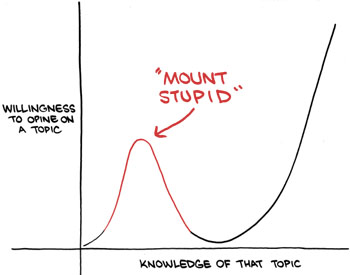Like most things; painting, psychology, sports, fashion, architecture; there are sets of fundamental rules, and everything else is just icing. Well yes and no…
Two researchers in the late 1990’s, Dunning and Kruger, conducted a series of experiments around the postulation that there is a fundamental disconnect between self-assessment and actual capability according to the level of exposure an individual has to true expertise in a given field. It’s only when you get to a certain level of experience that you can understand the gaps in your own ability. I’m sure you can think of immediate examples like sport or dancing, or singing or driving, but the important thing to recognize is that although Dunning & Kruger were primarily looking at the tail of the bell-curve in IQ, everyone suffers from some level of delusion when it comes to their capability Vs reality in one area or another.
On the surface, there’s not too much to dancing, you move various body parts around in time with music. When you see a prima ballerina dancing, you think you could easily learn to do that given the time and some serious attention. If you ask any person that’s ever studied ballet to any degree of seriousness, they’ll laugh and laugh. And possibly laugh some more. There needs to be a mixture of training, instinct, and experience. Without mindful application for many years, you ain’t doing anything of artistic merit in those slippers, Barry.

Now if it’s dancing, you’ll eventually sprain something. Singing; no harm done, well except perhaps to your immediate family. If it’s martial arts, conceivably it’s a little more dangerous if you decide to intervene in a scuffle. If it’s recruitment, you might just end up with an unstructured approach to interviewing, or have put together a set of standard questions (hopefully not the ‘what’s your greatest weakness’ question!) from Professor Google. In each case, your level of capability because you feel you’re good at something, doesn’t make it true. Without years of experience and refinement and fleeting real success driving you on, and reading books and articles online, spending the time to become an expert, you aren’t good at recruitment. Or dancing.
If you’re hiring people, there’s a very good chance that they will be instrumental in your success too. Is this the right environment for them? Do they have the right history to suggest success in this role? Will they be engaged and a positive influence on the rest of the team? If they’re in sales will they hit their number every quarter? If you’ve asked them about a time they had conflict at work, and what they did to work around it, or about their greatest strengths – how the hell are you qualified to answer whether they can deliver against these fundamental questions which lead to their performance and your success?
Unlike technical areas, organisations are unlikely to invest in improving their hiring processes. Unless it’s a cloud application that keeps notes that nobody will ever read on people that they’ll never see again. Do yourself, your team, your company, and the prospective hire the courtesy of learning how to interview, or deferring to people that have studied it for years and engaging them. A good recruitment or search firm will not only help you engage the right people, but show you how you can validate whether they are the right people for your team.
The real body of the iceberg isn’t what you can quickly wrap your head around – or what seems obvious – it’s about the nuances and variations that take years to appreciate. Don’t treat your hiring process as an afterthought.
Hoping to avoid the pitfalls of hiring?
Image attributable to the glorious pen of Randall at xkcd.com
Leave A Comment